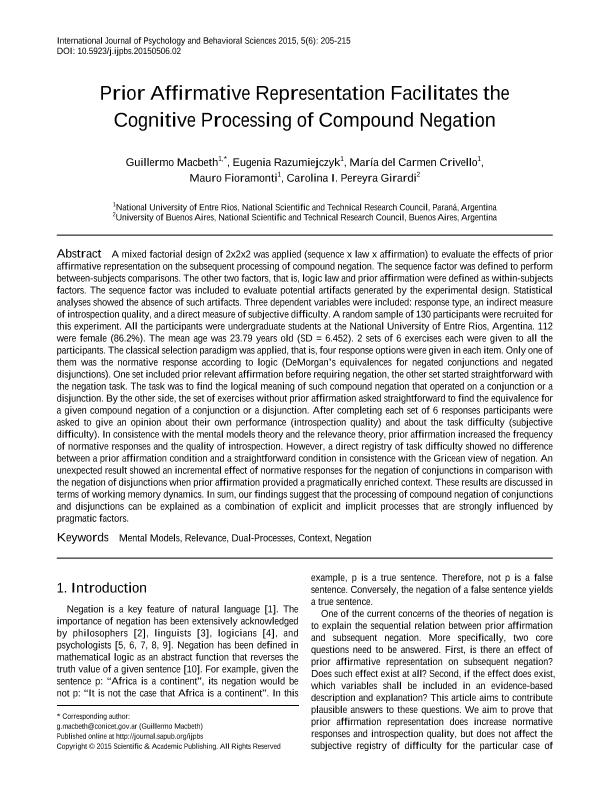Artículo
Prior Affirmative Representation Facilitates the Cognitive Processing of Compound Negation
Macbeth, Guillermo Eduardo ; Razumiejczyk, Eugenia
; Razumiejczyk, Eugenia ; Crivello, María del Carmen
; Crivello, María del Carmen ; Fioramonti, Mauro Bruno
; Fioramonti, Mauro Bruno ; Pereyra Girardi, Carolina Iris
; Pereyra Girardi, Carolina Iris
 ; Razumiejczyk, Eugenia
; Razumiejczyk, Eugenia ; Crivello, María del Carmen
; Crivello, María del Carmen ; Fioramonti, Mauro Bruno
; Fioramonti, Mauro Bruno ; Pereyra Girardi, Carolina Iris
; Pereyra Girardi, Carolina Iris
Fecha de publicación:
12/2015
Editorial:
Scientific & Academic Publishing
Revista:
International Journal of Psychology and Behavioral Sciences
ISSN:
2163-1946
e-ISSN:
2163-1956
Idioma:
Inglés
Tipo de recurso:
Artículo publicado
Clasificación temática:
Resumen
A mixed factorial design of 2x2x2 was applied (sequence x law x affirmation) to evaluate the effects of prior affirmative representation on the subsequent processing of compound negation. The sequence factor was defined to perform between-subjects comparisons. The other two factors, that is, logic law and prior affirmation were defined as within-subjects factors. The sequence factor was included to evaluate potential artifacts generated by the experimental design. Statistical analyses showed the absence of such artifacts. Three dependent variables were included: response type, an indirect measure of introspection quality, and a direct measure of subjective difficulty. A random sample of 130 participants were recruited for this experiment. All the participants were undergraduate students at the National University of Entre Rios, Argentina. 112 were female (86.2%). The mean age was 23.79 years old (SD = 6.452). 2 sets of 6 exercises each were given to all the participants. The classical selection paradigm was applied, that is, four response options were given in each item. Only one of them was the normative response according to logic (DeMorgan?s equivalences for negated conjunctions and negated disjunctions). One set included prior relevant affirmation before requiring negation, the other set started straightforward with the negation task. The task was to find the logical meaning of such compound negation that operated on a conjunction or a disjunction. By the other side, the set of exercises without prior affirmation asked straightforward to find the equivalence for a given compound negation of a conjunction or a disjunction. After completing each set of 6 responses participants were asked to give an opinion about their own performance (introspection quality) and about the task difficulty (subjective difficulty). In consistence with the mental models theory and the relevance theory, prior affirmation increased the frequency of normative responses and the quality of introspection. However, a direct registry of task difficulty showed no difference between a prior affirmation condition and a straightforward condition in consistence with the Gricean view of negation. An unexpected result showed an incremental effect of normative responses for the negation of conjunctions in comparison with the negation of disjunctions when prior affirmation provided a pragmatically enriched context. These results are discussed in terms of working memory dynamics. In sum, our findings suggest that the processing of compound negation of conjunctions and disjunctions can be explained as a combination of explicit and implicit processes that are strongly influenced by pragmatic factors.
Palabras clave:
MENTAL MODELS
,
RELEVANCE
,
DUAL-PROCESSES
,
CONTEXT
,
NEGATION
Archivos asociados
Licencia
Identificadores
Colecciones
Articulos(ININCA)
Articulos de INST.DE INVEST.CARDIOLOGICAS (I)
Articulos de INST.DE INVEST.CARDIOLOGICAS (I)
Articulos(SEDE CENTRAL)
Articulos de SEDE CENTRAL
Articulos de SEDE CENTRAL
Citación
Macbeth, Guillermo Eduardo; Razumiejczyk, Eugenia; Crivello, María del Carmen; Fioramonti, Mauro Bruno; Pereyra Girardi, Carolina Iris; Prior Affirmative Representation Facilitates the Cognitive Processing of Compound Negation; Scientific & Academic Publishing; International Journal of Psychology and Behavioral Sciences; 5; 6; 12-2015; 205-215
Compartir
Altmétricas



